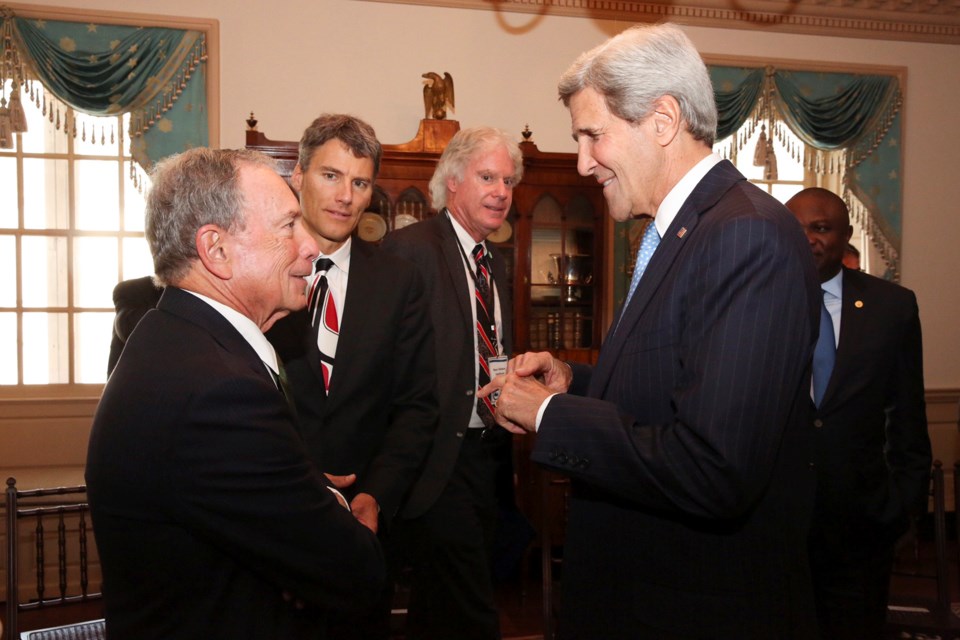And now a message from U.S. Secretary of State John Kerry…
Say what?
I had the exact same reaction when I came across Kerry’s name in a press release issued last week by the City of Vancouver.
No, he’s not the new city manager.
No, he’s not the city’s new planning head.
He likes Vancouver, though.
Let me rephrase that… he likes what Mayor Gregor Robertson and his council is up to in its ongoing crusade to make Vancouver the “greenest city in the world” by 2020.
And, as far as I know, that green has nothing to do with all those pot shops, although critics of the city’s laissez-faire approach to shutting down illegal marijuana dispensaries might argue otherwise.
But I digress.
According to the City of Vancouver’s release, Kerry “praised” the city’s goal of shifting to 100 per cent renewable energy by 2050. (If you’re keeping track, that’s greenest city by 2020, 100 per cent renewable energy by 2050).
Here’s Kerry…
“Huge wealth can be created even as you make people healthier, reduce the sickness that comes from particulates in the air and the cancer that comes with it,” he said. “More and more city leaders are coming to that conclusion… it’s why Vancouver set a goal of obtaining 100 per cent of its energy from renewable sources by 2050.”
That tip of the hat came last month when Mayor Gregor Robertson racked up some more air miles to fly to Washington, D.C. for the Our Cities, Our Climate summit. If you haven’t noticed, Robertson and company are on a “green” tear of late. As regular readers will recall, the mayor spent a few days at the Vatican this summer to join Pope Francis and other mayors from around the world to discuss climate change.
The same week Kerry showed up in a press release, the mayor spent Friday afternoon planting a tree on the grounds of city hall with some guy named David Suzuki.
Yes, that David Suzuki.
The planting of western red cedar was part of a ceremony in which the mayor and councillors presented Mr. Nature of Things with the “Freedom of the City Award” in recognition of his work around the globe to preserve the planet.
And as I write this piece on Tuesday morning, council is preparing to hear presentations from city staff on the “Greenest City Action Plan” and the “Renewable City Strategy.”
Both reports indicate Vancouver has made progress on the environmental front, reducing greenhouse gas emissions, expanding walking and cycling networks, adopting a new building code for new homes to reduce energy, attracting “green” jobs, creating a food strategy and establishing a $2-million fund to hand out to people leading “green” projects. The city also launched huge campaigns against Kinder Morgan’s plans to build a pipeline from Alberta to Burrard Inlet and to get the B.C. government and the feds to buck up for a subway along the Broadway corridor.
All of it is very progressive stuff.
Robertson will, no doubt, be touting the city’s achievements when he travels to France next month for the Paris Climate Conference. More acclaim will probably come via some study or magazine or think tank that measures how liveable or sustainable Vancouver is.
But while Kerry has praised Vancouver for its lofty goals, and the Pope has urged Robertson and other mayors to stay focused on climate change, the story making headlines in Vancouver this week — and last week, and the previous week — is not climate change.
It’s real estate, and how expensive it is.
So here’s the question: If Vancouver becomes the greenest city in the world by 2020 and the whole city is powered by renewable energy by 2050, who exactly is going to be able to afford to live here and enjoy it?
Asking for a friend.
mhowell@vancourier.com
@Howellings




